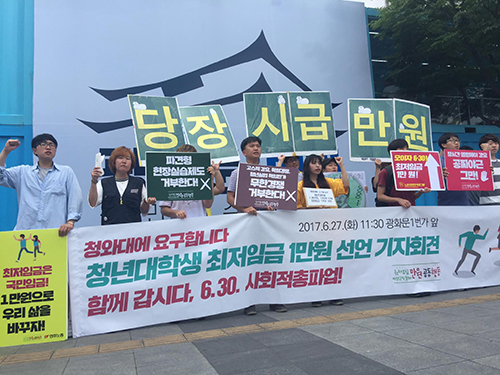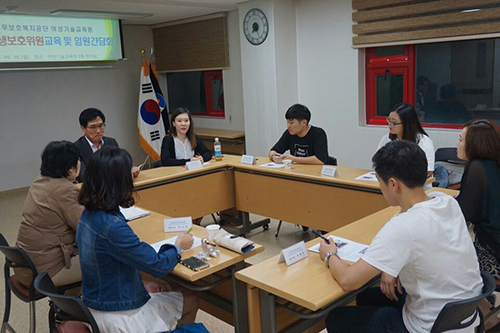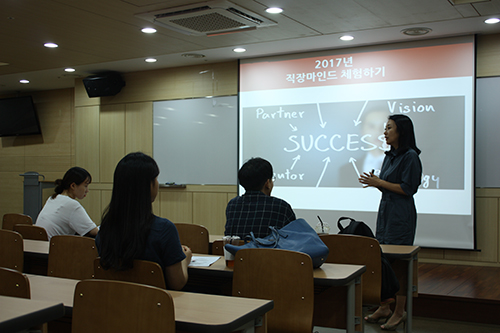Long way to go to solve the problems in work experience system
On June 1st, the Ministry of Education disseminated “Management Manual for University Student Work Experience” to every university, which includes policies to reinforce course requirement and expand management autonomy. It was enforced to improve chronic problems regarding a small salary for working passionately. Actually, many university students in upper grades gain work experience through their schools to learn about their dream job. In the case of Dongguk University, 708 students participated in work experience last year. Also, the school is running various programs in a dimension of various divisions to encourage students to join them. In such situations, several changes are expected in universities as a result of the manual revision.
How the work experience for university students is operating
“University students work experience” means a university-industry cooperation curriculum which provides students with practical education in the industry field. The work experience is operated as a course, focusing on cultivating students’ executive ability. It is also conducted according to the programs related to what each student majors in.
In case of four-year-course universities, just like Dongguk University, the work experience programs are especially targeting juniors and seniors who are in the forefront of employment. Before running the programs, the school mediate between the students and the companies to provide students with places for education. In addition, the work experience usually falls into two categories: a short-term program which continues for about four weeks and a long-term program that goes on for a semester. Such work experience programs are also recognized as each student’s credit as a part of the school curriculum.
Students suffer from work experience
However, there have been several problems from running the work experience program in universities. First of all, some students who gained work experience could not receive wages including transportation expenses from the company. Last year, through the parliamentary inspection of the administration, the leader of the Justice Party, Lee Jeong-mi disclosed that only 39,875 university students among 153,313 of them were paid for their work, accounting for roughly 26 percent. Especially, according to the statistics officially announced in “Daehakalimi,” a public notice system of university data, 27 universities among 35 four-year-course universities in Seoul showed the number of students who were paid for their work smaller than the number of ones who completed work experience.
 The youth and university students who are suffering from “Passion Pay,” a problem regarding small salary for working passionately, are holding a press conference requesting for the better environment in the field of dispatched work experience. /Photography from Korean Confederation of Trade Unions |
Regarding this matter, on June 27th, “10,000 won Action,” which is a group consisted of organizations working in the field of labor, hosted a press conference and called for solving the problem of “Passion Pay” including the case of on-a-job trainees. In the poster promoting the event, they described the dispatched students as the consumables who just provide cheap workforce to the companies. It also asserted the youth’s rights to work in better environment and demanded fair compensation.
In addition, while working in the companies, some students had not applied for accident insurance and had to be in poor surroundings. The statistics from “Daehakalimi” revealed that, in case of four-year-course universities in Seoul, 21 universities among 35 universities did not let their students, who participated in the work experience, all apply for the insurance. Such situation gets degenerated as the scope of the statistics is extended, not only among the four-year-course universities located in Seoul.
In fact, the related hands-on staff says that companies accommodating students are related to the way the students are treated there. Lee Jae-woo, the section chief of the Center for Entrepreneurship, mentioned, “The more stable the company’s situation is, the more spare time and welfare are provided to the students. Smaller companies usually have less supports to their workers, resulting in lower satisfaction.”
 The youth and university students who are suffering from “Passion Pay,” a problem regarding small salary for working passionately, are holding a press conference requesting for the better environment in the field of dispatched work experience. /Photography from Korean Confederation of Trade Unions |
To top it off, the quantitative valuation basis of work experience performance made universities concentrate more on increasing the number of students joining work experience programs. For example, The LINC Project, a national project aimed at reinforcing onsite training to cultivate person of ability, has an appraisal standard that reflects the proportion of students who completed a work experience program. In the performance report of the project, only a proportional increase is regarded as a development in the field of work experience system. Dongguk University has also joined the LINC Project and the school operates various programs such as “One business per one major work experience,” “IPP (Industry Professional Practice) long-term work experience,” and “Center for Entrepreneurship matching work experience” to encourage students join the programs actively. However, shortcomings still exist on the other side since the statistics of “Daehakalimi” say that 183 among 708 Donggukians, who had participated in the work experience program in 2016, were not paid.
Work experience manual revised with autonomy
While such weak points of the work experience programs for university students were coming to the surface, the Ministry of Education reorganized its management manual in terms of reinforcing course requirements and expanding autonomy in management. The Ministry of Education announced through a press release that the revision of the manual has been carried out in order to vindicate the work experience system’s honor described as “Passion Pay” or “Credit Pay” and to operate the field curriculum properly.
Regarding the reinforcement of course requirements, the school and business have to make an agreement and decide on several details beforehand such as plans for courses and a field guide, and who will be the people in charge of it. Moreover, universities should reinforce responsibility by strengthening field guidance and assuring the nation and local government to conduct the program appropriately. The revised manual also limits hours of operating work experience.
Another big part of the changes to the manual is to expand autonomy in management. The management-related elements, which comprise the university student work experience system, can be decided in accordance with each school’s own regulations. Moreover, while it was mandatory to pay for the students more than minimum wage level before, the matter of how much money should be paid and its methods in detail are permitted to be decided after universities and businesses negotiate with each other.
Expected improvements in students’ labor rights after the revision
Through the revision of the “Management Manual for University Student Work Experience,” students are expecting to see some positive effects. First of all, appropriate work experience can be provided to students. If a student quits in the middle of the practice because of difficulties, they could ask for a replacement to the school. Then the school would contact the workplace and talk over with the student to rearrange the position.
Also, companies should buy insurance obligatorily. So if a student get injured during work experience, a student can get compensation. Moreover, working hours cannot be over eight hours a day and 40 hours a week. These changes can protect a student physically and mentally from extended work.
“Passion Pay” problem remains caused by greater autonomy
However, the added rule regarding autonomy in the running of work experience could potentially cause several problems. In the past, except in particular circumstances, the principle was that the company must pay to aid students. This rule was to prevent the company problems from affecting universities. Now, after the revision of management manual for university student work experience, the regulation saying “Decide the payment based on output from student’s work and burden of the company” is added in terms of autonomy. This means that as the company does not need to pay, the obligatorily burden to company might decrease. Universities which had some troubles can select more companies easily than the past. As a result, the “Passion Pay” problem would get worse as the university and the company can set the payment as they want. Lee Jae-woo, the section chief of Youth Entrepreneurship Center, stated, “Even though the school has been given autonomy in the running of the program, the acceptance is up to the inside judgement. Thus, Dongguk University is taking the position that non-payment should not be the principle.”
According to the survey from employment portal site “Incruit,” 60.9 percent of 212 companies are feeling some burden as the minimum wage is going to increase in the following year. Company’s reaction is causing worries since this revision has changed the rule that they do not need to pay the minimum wage to students after the negotiation between universities and businesses. Companies could pay less than the minimum wage using the revision of manual as their excuse.
In relation to this rule, after the “Passion Pay” problem became a big issue, the Ministry of Education and the Ministry of Labor had a conflict regarding whether the students participating in work experience should be treated as a student or a laborer. The Ministry of Education maintains its position that payment should not be forced since work experience is a part of education. On the other hand, the Ministry of Labor states students should be treated as a laborer and the company must pay for their work. Thus, treating students either as students or laborers is at the discretion of universities and companies.
While the added rule might make the “Passion Pay” problem worse, some people criticize that the Ministry of Education is not aware of the problems based on the rules in the revised manual. The manual has not changed enough except the addition of the autonomy part. Furthermore, according to the press release, the Ministry first reported the revision saying, “As the work experience was first adopted for the purpose of practical capacity, unless it is managed wrongly, the ‘Passion Pay’ problem would be solved naturally.” It means the Ministry is taking a passive action and it is criticized due to the possibility of causing worse circumstances.
 The youth and university students who are suffering from “Passion Pay,” a problem regarding small salary for working passionately, are holding a press conference requesting for the better environment in the field of dispatched work experience. /Photography from Korean Confederation of Trade Unions |
The need of detailed management and gathering opinions
Due to this revision, students have worries and requirements. Kwon Hyeok-yeol majoring in Chinese Language and Literature noted, “The company I worked for was very small, having less than 20 employees. At first, the payment was only 11 to 20 dollars a month.” He added, “I think it is up to the value that students have. Some students would think payment should be sufficient. I agree with that but some startup companies like the one I worked at cannot pay a lot. I understood the situation and accepted the low pay.” Hence, except the particular situation, the company should pay students appropriately. Otherwise, some companies will misuse the rules and pretend they are not in the situation to pay right. He also stated, “If students can select the work experience company that suits with their major, they would get priceless experience like I did.”
Universities and companies now perceive they should be improved to contribute the solution of such problems. Shim Jae-sung, the collaborative professor of the IPP Project in Dongguk University, said, “We cancel the contract with the companies which fail to meet the standard such as proceeding unexpected work experience. Furthermore, we are visiting work experience companies before the contract. While the students are working, we visit the company in a month to check the situation and listen to difficulties students have. So we can consult with the company to mediate between the student and the company.” That is, universities should always monitor the companies and work for proper treatment to students.
The Ministry of Education is stating that they revised the manual for the purpose of solving university students’ work experience problems. However, this revision has not changed enough to solve the matters. Therefore, to fix the problems above, universities and companies should listen to students' voices and improve the issues they are confronting.

